Inside: As a teacher do you struggle to relax and sleep? Read for some tips from experts to help you get the best night’s sleep, a must-read for anyone + free printable.

As a busy teacher do you struggle to get the best night’s sleep? Or do you sleep, but wake up thinking about all of the tasks that you need to do? You might be thinking of ideas for your lessons or student support. I know I do!
Maybe you’re not getting enough sleep!
Or maybe you don’t get enough deep sleep. It’s a big problem for a lot of teachers.
All of the above was me…every night!
Thinking, thinking. Roll-over, squirm, think some more.
I know what it’s like to struggle to get a good nights sleep…
(This page probably contains affiliate links. See the full Disclosure Policy here).
The best night’s sleep: a struggle for a lot of teachers
A little while ago, I did some interesting research on my own personal sleep habits using my Fitbit tracker.
My sleep had gotten very poor over time and I would wake up in the morning feeling more tired than I went to bed. Do you relate?
Track your sleep habits
Anyway, the Fitbit, like many other fitness trackers can measure, not only how much sleep you are getting, but your sleep quality.
I think the sleep zones are: light, REM and deep sleep.
I began to realise that on the mornings that I felt more rested, (which wasn’t very often), were the nights that the tracker recorded that I had had more deep sleep than the other zones.
So, with this knowledge, I was on the search for strategies to help me to get into the deep sleep zone.
You’re probably wondering how to improve your sleep.
Here’s the deal.
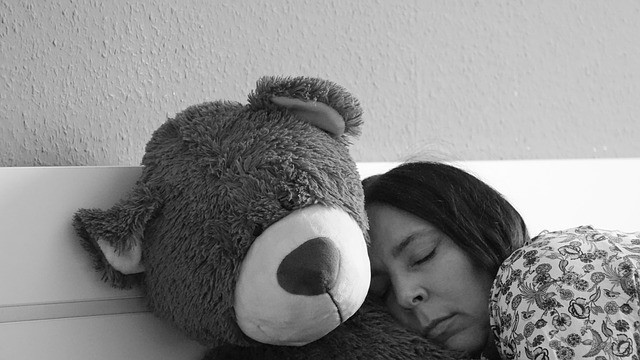
I don’t claim to be the sleep expert, but I know that the medical profession advises that sleep is one of the most important things we need for great health.
This good quality sleep, that we all crave, seems to be one of those things that can be elusive to some – especially teachers.
Many of us have so much on our minds.
We think deeply about our jobs and the huge responsibility that we have as educators.
This impacts our ability to wind down and relax in preparation for sleep.
How do you get the best night’s sleep?
Expert sleep tips explained:
Tip 1. Use a Quality Magnesium supplement
One of the best suggestions that I’ve recently found for great sleep is to take a quality Magnesium supplement. Dr
With multiple health professionals giving me this advice, also supported in the article called Magnesium – How is Affects your Sleep by Dr Micheal J Breus (The Sleep Doctor) and adding this into my nighttime routine has worked wonders to help the wind-down and relaxation process..
I have found that using a good quality magnesium supplement every night, plus additional products like Epsom Salts and magnesium oil, has improved the quality of my sleep, as well as keeping me asleep for longer.
Magnesium is known to be involved in many processes in the body; such as calming nerve excitement and aiding muscle relaxation (Dr Wayne Todd, 2015), so that we sleep more solidly.
This is what I needed with such an active mind at night, that often doesn’t quieten easily. (Please refer to my post about this great book SD Protocol.

You can buy the Ancient Minerals brand that I use from this link here.
Tip 2. Have a Regular Bedtime Routine
I have found that having a regular bedtime routine is a great tip for sleep.
A bedtime routine is the regular steps that you follow before bed that readies your body for sleep. This routine before bed that is all-important in signalling your brain that it’s time for winding down.
A consistent bedtime routine can include things like:
- Warm baths with Epsom salts (a form of Magnesium Sulfate)
- Activities to quieten your mind, such as deep breathing or having a quiet caffeine-free cup of tea.
- Writing in a gratitude journal
- Reading
- and most importantly: going to bed at the same time each night – Making sure that you have a consistent bedtime is helpful in setting your body clock. (Also waking up at the same time each day sets this pattern as well).
- Take magnesium spray or supplement
To be honest, I’m not good at my bedtime regularity… but its a great goal to work on!
3. Have a cool, dark Room
Having a dark, cool room is a great new tip that I’ve recently found to be so helpful for sleep.
Modern research has identified that to have good quality sleep we need to keep our sleep space as dark as possible.
Dr Amy Meyers, an expert on wellness and especially sleep, says that “your body needs to believe that is it surrounded by complete darkness to enter into the deepest, most restful sleep.”
I’ve also found that it’s a necessity to sleep in a cool room, as our body temperature needs to drop to maintain a healthy circadian rhythm necessary for sleep, (Myers, 2016).
According to the National Sleep Foundation study in the US, the optimal temperature for sleeping is between 15 and 19 degrees.
Temperatures above 24 degrees can cause impaired sleep quality.

I have endeavoured this summer to reduce the temperature in my bedroom and can I tell you it has helped greatly with my sleep quality.
(If you are interested in more about these stats and a very interesting read about sleep, look at Ben Greenfield Fitness post called: Deep Sleep Decoded: Everything You Need To Know To Increase Your Deep Sleep Percentages.)
Step 4. Take a Nightly Warm Bath
Having a warm bath every night is also a great way that I have found to settle myself ready for sleep.
For a lovely relaxing bath, while the water is running, add one half to one cup of Epsom salts (magnesium sulphate), dispersable oil (a great way to keep your skin soft – I use QV Oil or Alpha Keri oil), bubble bath and some essential oil; such as Lavender oi.
Lavender oil is well known for its relaxation properties. (See my post called 3 Essential Oils to Support Teacher Wellbeing, that gives tips about using Essential Oils for a restful nighttime bath).
Having a beautiful, hot bath can be part of your nightly bedtime routine, which will also support your self-care practice to nurture yourself.

Tip 5. Avoid Caffeine
I have found that caffeine is such a sleep inhibitor.
The older I have gotten, the more I have realised that caffeine has impacted my sleep – to a point now, that I totally avoid food and drinks that contain caffeine.
Food and Drinks with caffeine:
Foods such as dark chocolate contain caffeine, as well as well-known drinks like coffee and cola drinks. Surprisingly tea also has caffeine.
You may think that this is a difficult step to follow. So, if you can’t give up caffeine completely as I have, just try excluding these foods and drinks after midday.
I know this step was initially such a great way to help me to settle at night and be able to fall asleep more quickly.
Alternatives to caffeinated drinks
An alternative to caffeinated drinks is herbal teas and soft drinks like lemonade etc.
If you want to avoid sugar and need a replacement for bubbly drinks, have soda-water with fresh lemon and lime.

Tip 6. Turn Off Technology
I think turning off technology is an important tip these days to help us on our quest for great sleep.
According to Dr Amy Myers, a Functional Doctor, she believes that we need to institute an electronic shutdown at least one hour before bed – turning off all screens like our phones, computers and our televisions.
This means that your goal would be to minimize your exposure to the blue light that is emitted from these screens, so your body can prepare itself for sleep.
The blue light is what is emitted from many of your screens. Blue light can really impact your body’s ability to tell when it is night.
For some screens; like iPhones, a great tip to help minimize your nighttime exposure to blue light is to change the settings to ‘NightShift’ for Apple products and for Android the setting is called ‘night mode‘ and blue light filter.
What this setting does is turns off the blue light emissions and alters it to the red light, necessary for your brain to acknowledge that it is night.
I have a setting on my phone that automatically switches to ‘NightShift’ each night between 6:00 pm and 6:00 am. Try it out for yourself!
A tip to reduce blue light:
Wear red lens glasses to block blue light emissions.
This is a new thing. I wear my red lens glasses at night, especially when I feel like my sleep needs a boost or if I’m feeling stressed.
It was something that I did every night when my sleep was really bad and it helped a great deal.

Bonus tip to get the best night’s sleep:
Write things down!
The last tip that I’d like to offer, is my personal favourite to help you get to sleep: Write down your thoughts.
If you have thoughts going around and around in your head and they’re stopping sleep – write them down!
It’s so important to get them out of your head and onto paper!
To do this, use this clever listmaking system to jot down all of your ideas or ‘to-do’s) that are floating around in your head. This has been such a clever tip to use when sleep won’t come.
Read my post about how to use this system effectively.
The Best Night’s Sleep tips summarised:
- take a good quality magnesium supplement
- set up a regular bedtime routine
- take a warm relaxing bath as part of your bedtime routine
- avoid Caffeine at all costs
- ensure your sleeping space is dark and cool
- turn off technology – at least one hour before bed
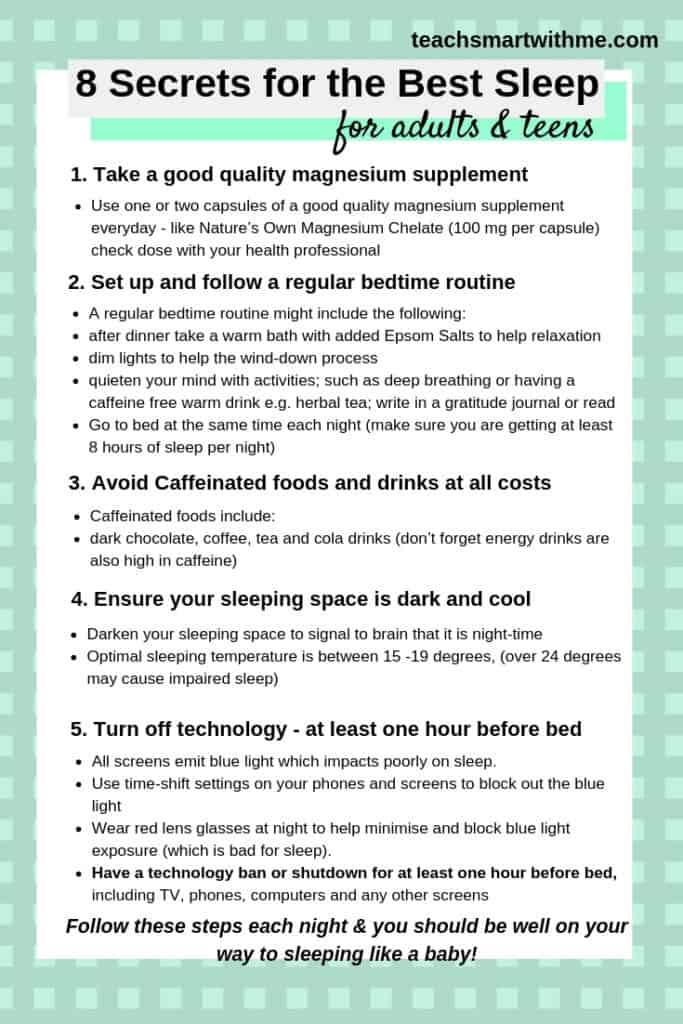
There are many more practical tips which I haven’t listed in this article, but can also improve your sleep.
If you are interested to know more, see below for my reference list for further really great information about sleep and wellness.
Don’t get me wrong, I don’t think I get it right all the time with my own sleep – it’s one of my weaker areas. I just know that sometimes good sleep just doesn’t happen.
Sometimes WE need to play a much more active role and do what we can to minimize the distractions that may impact good quality sleep and optimize our sleeping potential.
I hope these ideas can help the quality of your sleep so that you can get your best night’s sleep.
Remember you are worth it!
Michelle x
Don’t forget to download your free sleep tips printable here:
References:
Book – SD PROTOCOL By Dr Wayne Todd, 2015
Book – The Thyroid Connection by Amy Myers MD, 2016
Website: Ben Greenfield Fitness
RELATED ARTICLES
9 Quick Wins to Boost Teacher Energy, Naturally
Exposing 12 Self-Care Myths: Important for Teachers to Know
Want to remember this? Pin it to your favourite Pinterest board!
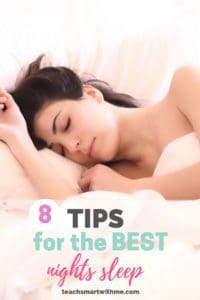
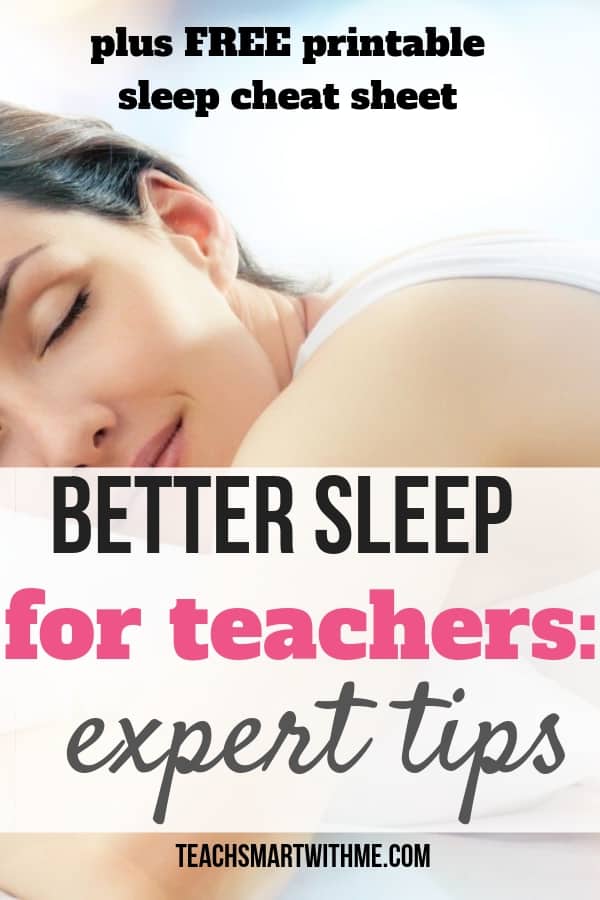
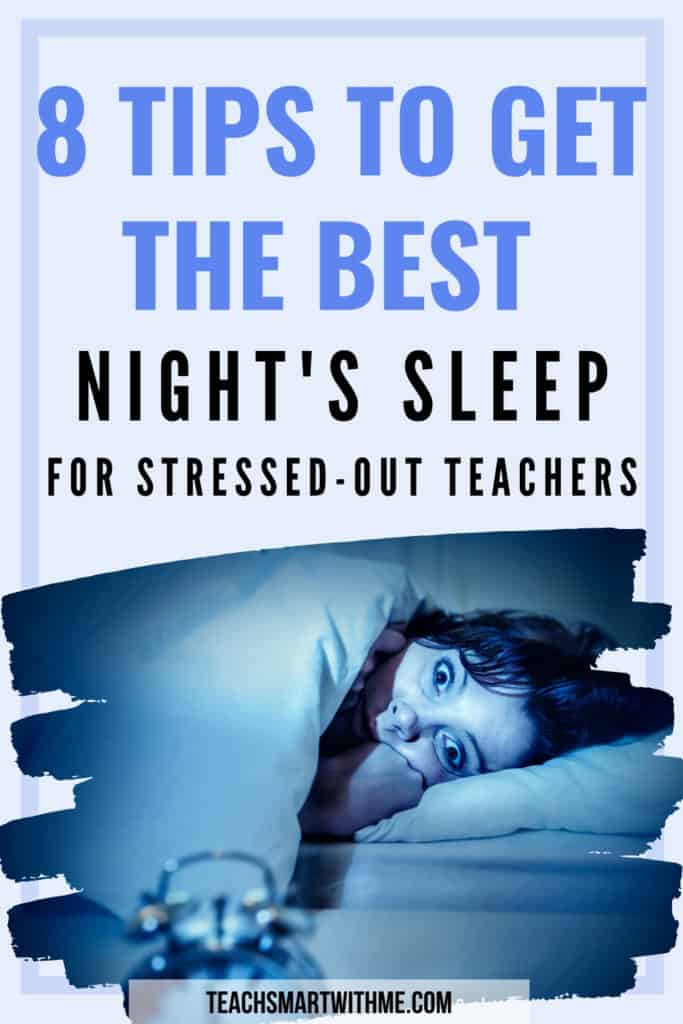
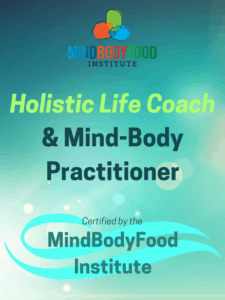

Leave a Reply